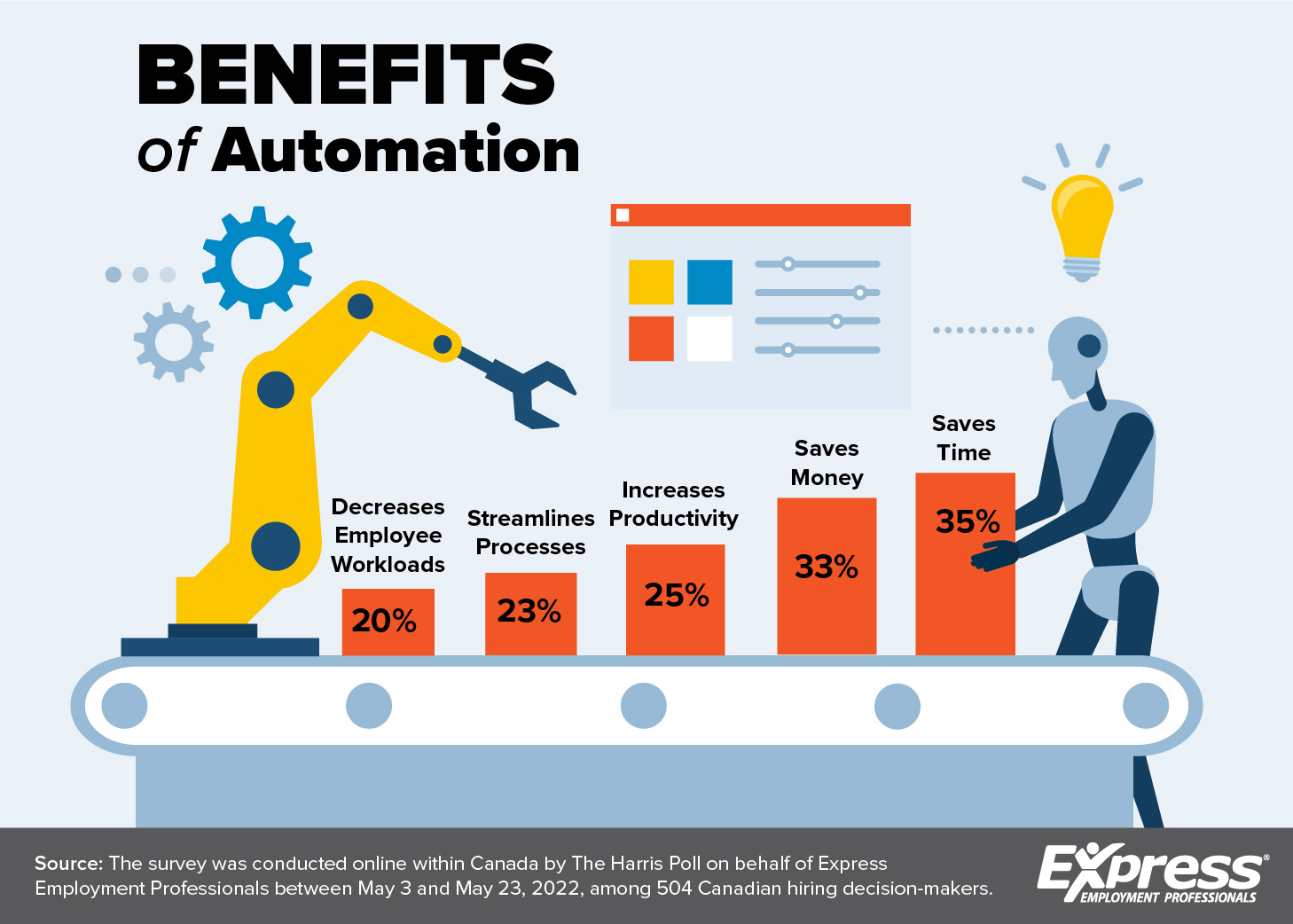Automation Shouldn’t Spook Companies and Employees Amidst Ongoing Labour Shortages
TORONTO - October 26, 2022

But Most Canadian Companies Do Not Plan to Increase Automation in Response to Labour Shortages
Despite facing ongoing labour shortages heading into the busy holiday shopping season with 40% of companies with open positions that cannot fill, most Canadian companies do not plan to increase automation, according to a survey from The Harris Poll commissioned by Express Employment Professionals.
A majority of hiring decisions-makers (57%) agree automation is key to ensuring businesses can keep up with current demand and half (50%) saying they waste time each week with tasks that could be automated. However, only a small minority of companies (17%) say they've adopted new technology to automate tasks because of labour shortages and most (64%) do not have plans to use automation to help alleviate labour shortages.
Saving time (35%), saving money (33%) and increasing productivity (25%) are among the top potential benefits of automation according to hiring decision-makers, while a quarter (25%) believe it could help streamline processes and a fifth (20%) feel it has the potential to decrease employee workloads.

When it comes to hiring and recruiting, companies say, on average, 17% of the process is automated. Unsurprisingly, companies with more than 100 employees have a higher average of automated functions than small businesses (2-9 employees: 7%, on average, 10-99 employees: 14%, 100+ employees: 22%).
There are many benefits to automation for both companies and employees, according to Halifax, Nova Scotia, Express franchise owner Shane DeCoste.
"In most cases, I believe automation starts as an end goal to drive efficiency in a business. While sometimes that impacts jobs, I don't think reducing employees is the driving force with most automation," said DeCoste. "Some of the benefits are a reduction in workplace injuries in labour intensive roles with shift times and lengths no longer as big of an obstacle."
But DeCoste warns that automation alone won't solve the labour shortage crisis.
"I don't believe that automation will end the labour shortage in the near term, but no doubt it could help relieve some of the current tightness in the labour market, especially for entry level roles," he added.
DeCoste points out that, while automation can sometimes result in the loss of some entry-level jobs, it can result in new higher skilled jobs being created as new machinery and technology require maintenance staff, operational trainers and even system designers.
When it comes to which companies are increasing automation, he says it's happening across all sizes and sectors.
"Larger companies may be investing in capital intensive machinery and smaller businesses may be investing in software to make their bookkeeping and invoicing process more streamlined," said DeCoste. "As automation options are becoming more available, it has become part of the path to continued growth for businesses."
"Companies have been forced to find a way to keep their businesses up and running and automation seems to provide a logical solution when so many workers are on the sidelines," Express Employment International CEO Bill Stoller said. "Instead of fearing it, automation could create opportunities for both employers and their staff to ensure business continuity and professional growth."
Survey Methodology
The survey was conducted online within Canada by The Harris Poll on behalf of Express Employment Professionals between May 3-23, 2022, among 504 Canadian hiring decision-makers (defined as adults ages 18+ in Canada who are employed full-time or self-employed, work at companies with more than one employee and have full/significant involvement in hiring decisions at their company). Data were weighted where necessary by company size to bring them into line with their actual proportions in the population.
###
If you would like to arrange for an interview to discuss this topic, please contact Ana Curic at
(613) 858-2622 or email
Ana@MapleLeafStrategies.com.
About Bill Stoller
William H. "Bill" Stoller is chairman and chief executive officer of Express Employment International. Founded in Oklahoma City, Oklahoma, the international staffing franchisor supports the Express Employment Professionals franchise and related brands. The Express franchise brand is an industry-leading, international staffing company with franchise locations in the U.S., Canada, South Africa, Australia, and New Zealand.
About Express Employment Professionals
At Express Employment Professionals, we're in the business of people. From job seekers to client companies, Express helps people thrive and businesses grow. Our international network of franchises offers localized staffing solutions to the communities they serve across the U.S., Canada, South Africa, Australia, and New Zealand, employing 586,000 people globally in 2021 and 10 million since its inception. For more information, visit
ExpressPros.com/CA.